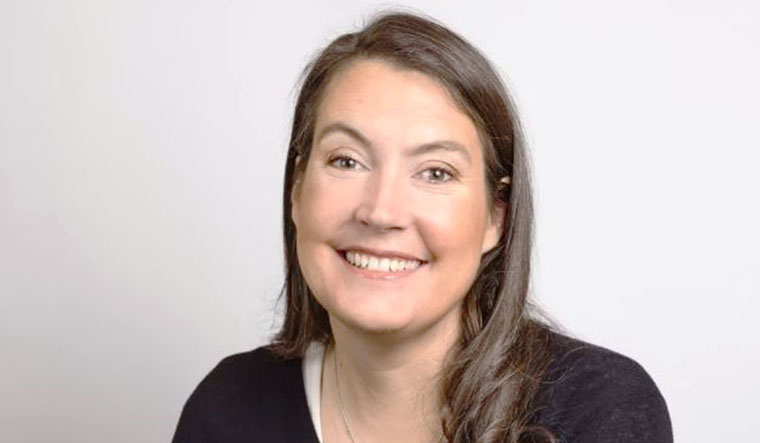Royal DSM, a global company, which has been working towards supporting nutritional needs of Indian population for decades, has taken key steps in rice fortification and also innovations that make nutritional supplements more flavourful due to their merger with Firmenich. Geraldine Matchett, Co-CEO and CFO, Royal DSM, who was visiting the Hyderabad facility, talks about their company’s efforts to address the nutritional needs of the target population within India and also across the world.
Can you provide insights into DSM's work in India?
DSM is the world's leading company in micronutrients, with a rich history of 150 years. We possess extensive knowledge about vitamins, omega-3, pre and probiotics, and gut health. When it comes to human health, we focus on understanding what people are consuming now.
When you look at the population of India, you have two parallel challenges- the too much of and the too little of- at the same time and sometime in the same person.
Excessive consumption of sugar, fats, and salt poses a considerable health risk and contributes to non-communicable diseases, which are major challenges for nations, especially with ageing populations. It is crucial to address healthy ageing, as improper diets can lead to expensive healthcare issues, hospitals, and challenges related to old age.
At the same time, micronutrient deficiencies, such as vitamin D and vitamin A, are common, even among individuals who consume sufficient food. This issue is particularly concerning for pregnant young women, mothers, and young children. Insufficient intake of micronutrients during the first thousand days, including in the womb, hampers metabolic development irreversibly. Acute consequences include stunting and cognitive impairment, which cannot be fixed later in life. These acute and permanent issue primarily affects populations without enough nutritious food, and we aim to address their needs through the fortification of staple foods.
Our work extends beyond India, as we collaborate with governments and organizations like the World Food Programme to reach more individuals. In the wealthier part of the population or those with sufficient food, we focus on transforming habits by offering market innovations that reduce sugar consumption, replace it with healthier alternatives, and incorporate micronutrients into popular and delicious food choices.
Could you discuss the positive impact of rice fortification on individuals or communities, and how it has improved their lives?
Absolutely! We have a unit in Hyderabad. When addressing the nutritional deficiencies prevalent among certain sections of the population, fortifying staple foods has proven to be a cost-effecient approach to reach as many people as possible. This includes fortifying salt with iodine and oil with vitamin A. However, a relatively recent development in this field is the fortification of rice, which is a very important staple food.
It is crucial to emphasize that if you fortify correctly, it makes a big impact. In Singapore, it had a noticeable impact on the health of various groups, particularly workers on construction sites, in terms of health benefits.
We have been actively involved in the development of unique technology for rice fortification, as it requires incorporating multiple micronutrients while ensuring stability and appropriate dosage. When you are cooking, it is important for fortified rice to retain its nutritional value and not lose its value to water. Ideally, the fortified rice must be enjoyed without even realizing that it's fortified. I think India can be a great exporter of rice kernels because of the vast rice production. India could actually be a leading nation when it comes to providing fortified rice to a lot of parts of the world that really need it.
How is Firmenich, the fragrance and flavour company you recently merged, driving your innovation?
What is very exciting about DSM and Firmenich is we (DSM) bring the science of the micronutrients and Firmenich brings the flavours and fragrance. So they understand how to make something delicious. This is something we struggled with in the past as people would think “I do like this since it tastes better.” So we had to make a trade-off, you know, a lot of consumers had to choose between healthy or yummy, now we are going to be able to do both. So we are going to be able to combine the desirable and the essential. There has been a lot of innovation. For example, let me just give one other segment that we work in- our dietary supplements.
For those who don't particularly like eating pills, the dietary supplements now are increasingly gummies, shakes and sprinkles. Thanks to Firmenich, we will be able to develop products with the same clients to actually bring to market things that can actually be consumed and the people are going to consume for as long as they are supposed to.
what are the immediate goals of DSM for India?
Our company has a strength of 1,700 people in the country and I can proudly say that they are serving the world. We believe in tapping into the brains of India. The great talents are supporting the whole value creation of our company. We are invested in the facilities and in training talents here. And when it comes to our ambitions for India, in terms of our activities and our business, it is to absolutely contribute to the evolution of what is being offered in the market.
And, so we very much hope that we will be able to combine our innovations and be much better at innovating in India, for India.
One thing I have learned and that has been repeated to me many times is if you want to succeed in India, then develop in India for the Indian markets. Though we have more than 2,000 top scientists around the world, the innovation and application centres are here in India.



